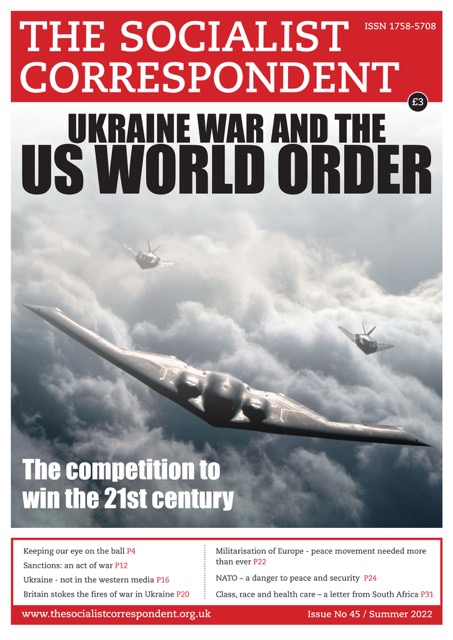Issue 45 Summer 2022
CONTENTS: Keeping our eye on the ball, Frieda Park: War in Ukraine and the competition to win the 21st century, Simon Korner: Sanctions - an act of war, Alex Davidson: Ukraine - not in the Western media, Gregor Tassie: Britain stokes the fires of war in Ukraine, Milly Cunningham: militarisation of Europe - peace movement needed more than ever, Arthur West: NATO - a danger to peace and security, Pat Turnbull: NATO's literary fiction - "so the reader may better understand", Clare Bailey: Global food crisis, Marianne Hitchen: Class, race and health care - a letter from South Africa, James Grant: P&O - bad apple, rotten system, Helen Christopher: Meeting the British, Paul Muldoon
Commentary
The implications of the war in Ukraine are enormous, not only for those caught up in it but also for the future of global relationships between nations and blocs – for war or peace.
War, of course is not new and recently peoples across the world have grim experience of it in countries invaded by the West and wars conducted by their proxies. This includes in Afghanistan, Iraq, Syria, Libya and Yemen. In recent decades hundreds of thousands have died, millions have been injured, had their homes destroyed and been made refugees.
Ukraine - US responsibility
The war in Ukraine is different, however, in that it is a confrontation between Russia, an emerging power rich in natural resources with a strong military including nuclear weapons and, effectively, the United States. In this it has the full support of the Conservative government in the UK. As Simon Korner sets out in War in Ukraine and the competition to win the 21st century it is the United States that has shaped the world in which this conflict escalated and it calls the shots on the direction of the war and sanctions. This war is an outcome of the United States’ determination to retain its status as the world’s only superpower. It will allow no challenges to that. Korner and Pat Turnbull in, NATO – a danger to peace and security, describe the military encirclement of Russia which has progressed steadily since the end of the Soviet Union and in defiance of commitments given to Soviet leaders that NATO would not expand eastwards. The 14 countries that have joined NATO since have brought nuclear and other offensive weapons closer to Russia’s border, representing a growing threat. That build up over time and, more immediately, the increased shelling of Donetsk and Luhansk by Ukraine set the scene for the Russian reaction when it went into Ukraine.
Global tensions and sanctions
Korner goes on to explore the ramifications of the war for global relations between regional powers, the developing world and inter-imperialist rivalries. On the surface the United States is getting its way, forcing the EU, particularly Germany, into line but many tensions remain. Germany totally capitulated to US demands to end the Nord Stream 2 gas pipeline and upped its military spending to record levels. The US is keeping the pressure on EU countries to end imports of oil and gas from Russia as it seeks a market for its own liquified natural gas. But differences are emerging within the EU over this. What is perhaps most surprising in the current situation, however, is not that countries have capitulated to the US, but that so many have refused to join in with sanctions. This includes big swathes of the global south and important economies like India and Turkey.
The sanctions regime being imposed at the behest of the United States demonstrates its role in determining the direction of the war. It has expressed no interest in negotiations and wants to prolong the war to debilitate Russia as far as possible. It is prepared to fight to the last drop of Ukrainian blood to achieve this. Alex Davidson describes in, Sanctions: an act of war, the many problems being caused by US sanctions over and above the problems caused by the war itself. The major loser is unlikely to be Russia, which has alternative financial systems and markets to get round the effects of sanctions and is self-sufficient in food and energy. It will, rather, be US allies particularly in Europe who are dependent on Russian gas and oil supplies as well as essential metals used in high tech products and nuclear technology. The effects on the developing world will be even worse with a looming food crisis. The United States itself is relatively isolated from the impact of the sanctions it is imposing on the rest of the world. As it stokes war with Russia and threatens the same with China, it is also undermining European economies and further impoverishing the developing countries. It is creating a world of chaos and dependency which it can better control.
However, the all-out confrontational strategy of the US to face down any country which threatens its superpower status is creating a reaction which is also weakening its authority and dominance. A key feature of this, which Davidson describes, is the shift from countries using the dollar in transactions to other currencies.
United States threat to peace
The United States is pursuing a highly aggressive strategy in world affairs and is now overtly talking about war with China over Taiwan. Using the same playbook that it deployed in Ukraine, it is moving ever closer to reneging on international agreements over the status of the island, seeking to provoke a response from China as it did with Russia.
The United States strategy threatens lives and economies across the globe. That is why in the midst of the censorship and blanket propaganda of the mainstream media which promotes only the US line with no dissent we must, as Frieda Park says, Keep our eye on the ball. The United States is creating a dangerous and unstable world and represents the major threat to world peace. That is what we need to focus on.
Read the PDF version of Issue 45

